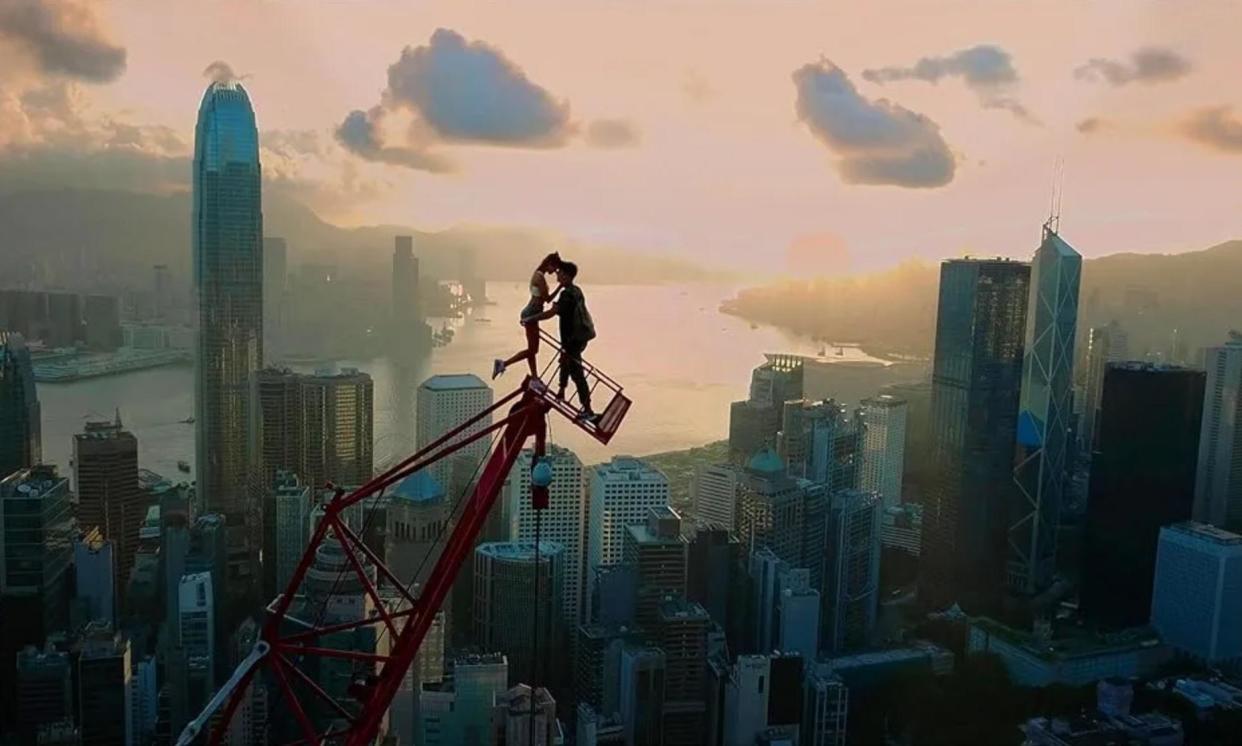‘Our full potential is on the other side of fear’: a vertigo-inducing look at ‘rooftopping’

A new film on the death-defying illegal stunts by two high-profile “rooftoppers” has premiered at the Sundance film festival, attracting critical acclaim and comparisons to Free Solo, the Oscar-winning documentary on the climber Alex Honnold and Man on Wire, a Sundance hit 16 years ago on the urban tightrope walker Philippe Petit.
Related: Girls State review – compelling follow-up to hit documentary
Skywalkers: A Love Story, which premiered on Thursday night at the Utah film festival, follows Russian couple, Angela Nikolau and Vanya Kuznetsov, who goes publicly by the name Ivan Beerkus, as they forge a romantic relationship while illegally summiting skyscrapers and filming their stunts for social media. The documentary opens in the middle of their headline-making attempt to climb Merdeka 118 in Kuala Lumpur, Malaysia – the world’s second-tallest building and heavily guarded during the final phase of its construction – while guards were distracted during the World Cup final in December 2022, prompting an investigation by Malaysian authorities.
Filmed over six years in six different countries, Skywalkers, from the directors Jeff Zimbalist and Maria Bukhonina, traces the duo’s entry into the controversial sport of “rooftopping” – in which climbers scale buildings, spires, cranes or other man-made structures without safety harnesses – separately in Russia, and then together, as well as the factors, including social media crackdowns in Russia and the invasion of Ukraine, that drove them to illegally climb Merdeka.
Beerkus, a talented climber and cameraman, first developed a following on social media for his extreme rooftop selfies, with nothing between him and the camera but thousands of feet to fall; his work garnered sponsors who funded riskier ventures and greater heights around the world. Nikolau, the daughter of circus performers, grew up with her grandmother in Kostroma, Russia, after her father abandoned the family and her mother sank into crippling depression. She says she turned to rooftopping as a means of legacy and escape, garnering a following for her gymnastics poses on the edge of buildings.
Individually, the two eked out livings via the extreme, highly dangerous sport (at one point in the film, Nikolau learns that most of her former Moscow rooftopping crew are “gone” – dead from falls). Together, the two made better money with the narrative of their love – and high-altitude kiss selfies – while scaling a who’s who of structures.
The film uses rooftopping – or as the couple refers to it, given their artistic flourishes, “skywalking” – as a metaphor for romantic trust, a notion particularly difficult for Nikolau, whose motto was “never rely on anyone except yourself”. It presents their line of work as a heist-like art of avoiding detection by authorities, listing the couple’s numerous strategies for deception, trespassing and disguise. “We’re just artists filming the city from up high,” says Beerkus after they’re spotted and arrested scaling a cathedral in Paris. The two claim to value “clean work” and, though they do not downplay the risks, argue for the justification of rooftopping as art and sport first. In doing illegal stunts that push one’s luck, Nikolau invokes an old circus saying: “Our full potential is on the other side of fear.”
It’s not an adrenaline addiction, she claims at one point. “It’s a commitment to self-growth.”
Skywalkers also delves into the financial pressures contributing to the couple’s ever-riskier attempts, culminating with a planned acrobatic hold atop Merdeka, which is billed in the film logline as a stunt to “salvage both their career and relationship”. Before the pandemic, the couple made a living through sponsorships on Instagram, which funded their travel, gear and other expenses in exchange for death-defying footage. Covid, they say, cut off such money, forcing Nikolau to turn to modeling and making product placement social media content to support them. The invasion of Ukraine, which prompted a social media and censorship crackdown in Russia, decimated what income remained, lest either of the two take an office job (Beerkus’s parents unsuccessfully push him to take a “trading” job with a family friend). In a last-ditch attempt to make money, the couple turned to non-fungible tokens (NFTs) derived from their stunt footage to make a living. Nikolau also makes paintings from sex toy materials, according to her Instagram.
The summit of Merdeka tower – a “virgin tower”, as Nikolau puts it, since no one had scaled it – two groups were arrested en route before their attempt – is pitched as a comeback attempt to make cash through a fickle, upstart new field. Beerkus says they spent the last of their money on plane tickets to Bangkok, Thailand, a less prosecutorial country that Malaysia where they trained for several months. The final third of the documentary has the feeling of a heist film, as the two scope out Merdeka tower through sources, building plans and hired drones and practice their sense-defying acrobatic lift – Beerkus holding Nikolau above his head, her limbs outstretched – for the top of the spire.
The film’s production and high risk recalls Free Solo, in which the directors Jimmy Chin and Elizabeth Chai Vasarhelyi struggled with the ethical implications of potentially filming Honnold’s death as he climbed Yosemite’s El Capitan without a rope. Free Solo was a critical hit when it premiered at the 2018 Telluride and Toronto international film festivals, and went on to win the Oscar for best documentary.
The film is currently seeking distribution at Sundance.

 Yahoo Movies
Yahoo Movies 
